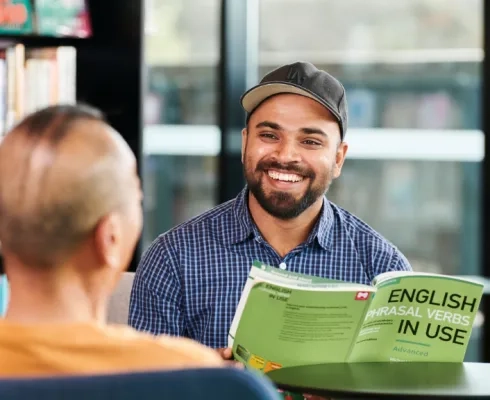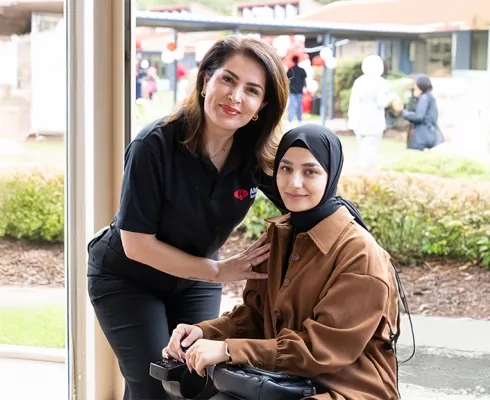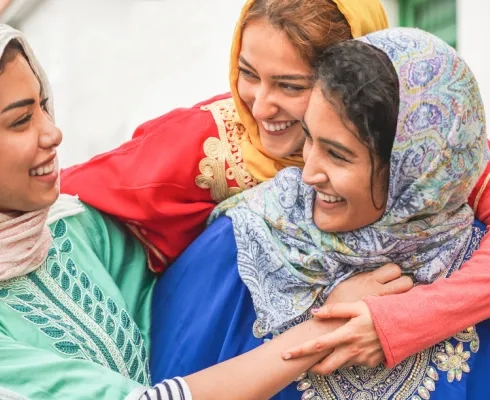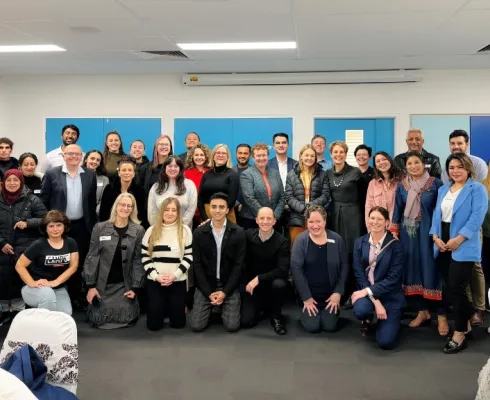Preventing Violence against Women in the Chinese Community Online Forum
Hosted by Chinese Community Social Services Centre Inc. Regional Family Violence Partnership
27 April 2021
Key note speech by Wendy Lobwein from AMES Australia
I am so pleased to be here today. I am speaking to you from the suburb of Brunswick, the country of the Wurundjeri Woi Wurrung people. I pay my respects to the traditional
custodians of the land, their elders past and present, and honour the 60,000 years they have cared for the land and waters of what is home for me and many of you.
I want to tell you a bit about my background and what led me to working to prevent violence against women.
I started learning about violence when I worked at the Centre Against Sexual Assault here in Melbourne, and saw first-hand the violence suffered by women and children in recent and past assaults.
I next worked in an organisation called Foundation House, where refugees who had suffered war or torture before they came to Australia could be supported, and there I saw the
effects on women from their sufferings of violence during war or while fleeing conflict.
I moved internationally then to work in the international war crimes courts. I was chief of the victims and witnesses sections of the International Criminal Tribunal for the former
Yugoslavia, a court set up to hear crimes committed in war when the countries within Yugoslavia split up. I held a similar position in Cambodia for a number of years, working for a court hearing crimes committed by the Khmer Rouge when that regime took over the country. I worked with many other countries hearing such crimes, Rwanda, Sierra Leone, East Timor. Many times women who were coming to the court to testify about old war crimes, told me about recent abuse they were experiencing at home. In Cambodia a witness asked me for witness protection. I thought she would tell me about her fears of reprisal or intimidation by ex-Khmer Rouge cadre who didn’t want her to testify. But her fear was that her husband would kill the children if she was away from the home overnight and couldn’t protect them.
I realised then, that violence against women was everywhere. All the time. In peace-time and in war-time. And I also realised that it would never end unless we found out the root
causes, and changed them.
Changed our worlds, our cultures, our communities, so this violence could be prevented from happening in the first place.
AMES Australia where I work now, has been running courses in the Primary Prevention of Violence against Women in culturally and linguistically diverse communities since 2017. AMES started this work because there were new State and Federal initiatives to reduce violence against women and the resources and knowledge was very Anglo-cenric and not reaching non-main English speaking communities. In 2020, Peter Chen, a co-organisor of this forum and 17 other inspiring members of Chinese speaking communities of Melbourne completed that course. They join 127 other graduates of the AMES course from more than 20 different linguistic and cultural groups who are changing our worlds, our cultures and our communities, to end this violence.
This forum is being held in two of the Chinese languages. It could be held in any, and every language, of the world. Violence against women in prevalent in all cultural and linguistic groups. It is a global issue.
Globally?
The World Health Organisation estimates that about a third of all women aged 15 or older will experience some form of sexual or physical violence in their lifetime.
The latest United Nations figures show that 137 women across the world are killed every day by a partner or member of their own family – a total of 50,000 women a year murdered by men they know and should be able to trust.
That is six women every hour, killed by men, mostly by men in these women’s own family or their partners.
In Australia, murder of women averages at about one per week. Every week. In the past week or so, there were three, Kelly Wilkinson 27 years old, Lordy Ramadan, 49 years, and Kobi Shepherdson, 9 months old, though Kobe isn’t counted in our national statistics because she was an infant.
Family violence can end in murder, in death. But it doesn’t start there.
(Professor Charlotte Bunch of Rutgers University)
A prominent leader once said “Violence against women and girls is still so deeply embedded in cultures around the world that it is almost invisible. Yet this brutality is not inevitable. Once recognised for what it is - it can be dismantled”
“Once recognised for what it is”…..So what is it?
One thing we know, violence is different for women than it is for men. “What about men” is a question always raised whenever we talk about violence against women. Yes, men
experience violence too.
So why do we say violence against women is a gendered issue, what does that mean?
It means; Women are far more likely than men to experience sexual violence and violence from a partner or male family member, and with more severe impacts.
It means: Women are far more likely than men to be afraid of, hospitalised by, or killed by a partner.
It means; Around 95% of all victims of violence, whether women or men, experience violence from a male perpetrator.
In 2017, the Australian Personal Safety Survey found that men are more likely to be physically assaulted by other men, usually strangers, outside of their home. In contrast, most women (92%) reported being assaulted by a man they knew, mainly in their home. Generally men go home and are safe, safe in the place where women are least safe.
Men and some women can become defensive and hostile when men’s violence against women is raised. Some men see it as ‘anti-male’ and feel blamed. If we take it off individual men’s backs and look at it from a global cultural perspective, we can see that the rates of men’s violence against women are higher in societies in which manhood is culturally defined in terms of power, toughness, or male honour. In our own backyard, we’ve seen it exposed in recent years in the culture of Aussie Rules football.
Globally and across cultures, wherever male economic and decision-making power in the family is strongest, we see the highest levels of violence against women.
This means that violence against women isn’t because of a few bad men, 56 bad men a year in Australia. It’s a problem of normal ordinary men and women, normal ordinary life in all the normal everyday cultures and communities of the world, and of Australia.
I understood a bit better what men’s privilege and dominance means when I read about an American teacher’s experience. She was a substitute teacher, so just stepping in for a
couple of weeks for another teacher to take over a class of 6 year olds. In the first few days she noticed that the little boys talked most of the time and put their hands up most of the time. She decided she would call on the little girls to speak more often to make it more equal. At the end of the week, some of the little boys, dear little boys with no malice or
anything in their hearts starting saying to her “it’s not fair, we never get to talk anymore”.
So very young and already because of their experience they were so used to having more privilege in the class that equality felt unfair. This is where it starts. It starts with gender
inequality.
And on top of gender inequality, what is known as rigid gender roles. One role for men. One role for women. For example as Ken Lay, a previous Victorian Commissioner for Police put it,
- Boys are taught to blame circumstance for their aggression – girls to think about how they might have provoked it.
- Boys learn by acting out – girls learn by simply enduring their experiences.
- This leads to boys externalising their behaviour – when things go bad, it’s because of other people or other things.
- But we encourage girls to internalise their experiences – to imagine that the fault lay somewhere deep inside them.
We learn these roles from birth. We have a cultural problem.
I am talking in “conference language”, let me use someone else’s language, ABC reported an interview earlier this month about Hua, a Chinese speaking woman who left her abusive husband, she said she didn’t recognise it as abuse at first;
"when my child began to cry, my husband would get really mad and would say that I was not looking after our child properly,"
"If my husband did not sleep well or if he was not in a good mood, he would begin threatening me."
Delia Lin, an associate professor in Chinese Studies at the University of Melbourne's Asia Institute, said while the Chinese community is broad and varied, there are cultural
differences that lead to vulnerability for Chinese-Australian women. She stressed that,
"Chinese culture praises concepts that harmony at home brings prosperity; women should be tolerant and not shame the family”. The culture encourages women to endure.
Parental pressure and maintaining harmony were concerns for Hua's family. Hua said she wasn't always believed. When she told her parents, she said they dismissed her experience. "When I was beaten, not only did my parents not advise me to leave, but they would think that I must have done something wrong if I was getting hit. I was led to believe it was my fault."
This is not so different from the cultural rules that I quoted from the Police commission just a few minutes ago. Boys are taught to blame other and circumstances for their aggression, girls to try not to provoke it believing that fault lays in them.
Australia has a cultural problem. It is harming our society, it is especially harming women and children.
Chimamanda Ngozi Adichie is a Nigerian writer. She says “Culture does not make people. People make culture. If it is true that the full humanity of women is not our culture, then we can and must make it our culture.”
Fear of shame and blame for speaking out keeps women and men silent. The very fact of this forum is already changing that. You are making it ok to speak out, and speaking out will change our culture.
You have some terrific leaders presenting in panels today, it is going to be a great forum.
Thank you.






